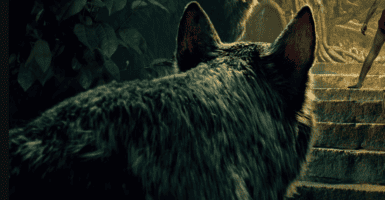Gen V Proves Why Sometimes Shock Value Is Lame
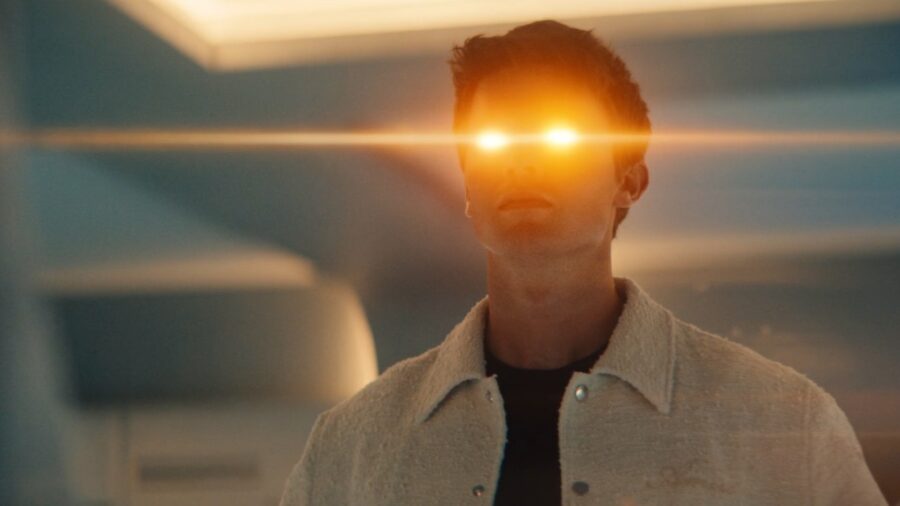
In the latest episode of Amazon‘s Gen V, “Jumanji,” the series kills off the minor character Dusty who was introduced in the previous episode as a supe whose only power is slow aging. The way Dusty is killed is troubling because it happens far too quickly, it isn’t explained, and by the end of the episode the people behind the camera seem to forget they killed him. While Gen V so far has been excellent, the moment reveals something of a weak spot of a series with–like The Boys–so much abrupt and brutal violence.
Dusty’s death in the most recent episode of Gen V is indicative of more violent and brutal media rendering death meaningless.
“Jumanji” opens with Cate using her ability to give back all the memories she’d hidden from her friends. The effort pushes her over the edge, rendering her unconscious.
Most of the lead characters–along with Dusty, only because he’s in the vicinity–are psychically dragged into Cate’s struggling mind. A brief chat with an imaginary Soldier Boy informs the heroes that if they can’t escape the psychic landscape before Cate falls into a coma, they’ll become “vegetables” too.
The Gen V heroes find themselves not only in Cate’s memories but each other’s. The memories of Cate and Andre blend together, and the other heroes learn of the couple’s affair. The psychic manifestation of Luke aka Golden Boy attacks Andre, but his eye beams instead end up liquefying the fleeing Dusty.
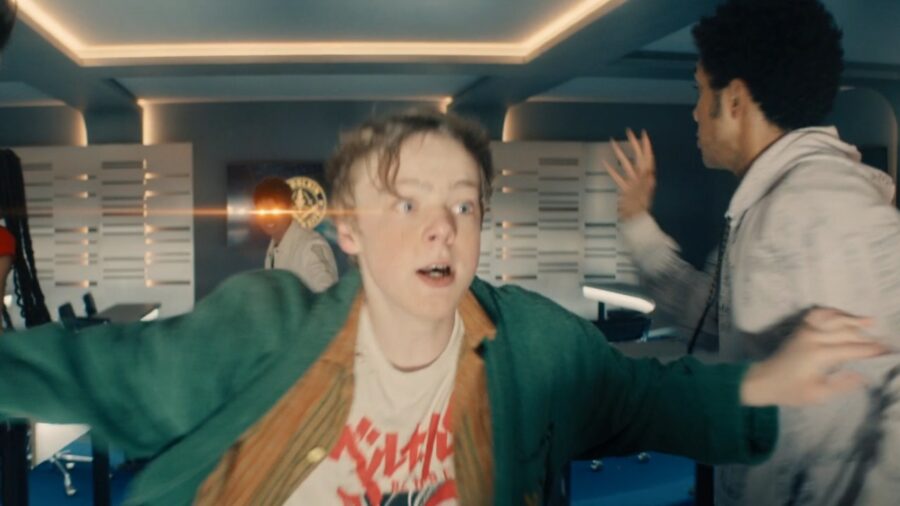
The Gen V killing happens so quickly, at first I wasn’t sure it was Dusty who was killed. I thought maybe it was just another psychic manifestation of a student in the imaginary classroom who got blasted, but they would have no reason–as Dusty does–to yell, “Out of the way, c-nts!” just before Golden Boy annihilates him. I had to rewind the episode a couple of times to confirm that, yes, it is Dusty who Luke turns into goo.
Dusty’s death in “Jumanji” doesn’t mean anything.
Still, I wasn’t sure if Dusty was actually dead. After all, the Golden Boy we see in this scene isn’t real — he’s a manifestation of both Andre and Cate’s memories. Not to mention that Soldier Boy only tells them they need to escape Cate’s mind before she goes comatose, not that dying in her mind is the same as dying in a dream in a Nightmare on Elm Street movie; i.e. you die there, you die in the physical world.
I assumed the latest Gen V episode would end with an answer about Dusty. After all, if dying in Cate’s mind means dying in the physical world, he should still be in the physical world, right? His corpse should be there or–if somehow he liquefies just as he does in the psychic plane–one of the other heroes should wake up and say something like, “hey what’s this puddle over–oh.”
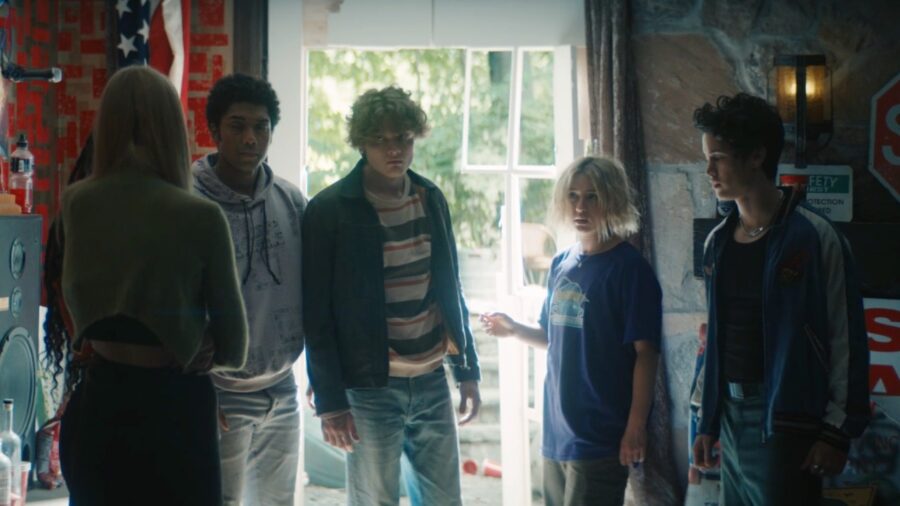
Instead, “Jumanji” ends without any sign or mention of Dusty or a puddle that used to be Dusty. The heroes wake up from their psychic struggle, Sam and Emma show up, there’s a brief scuffle after Sam recognizes Cate, Emma talks Sam down, and Marie issues a call to action.
When you think of the shocking, powerful death scenes in television, they are as memorable as they are because the deaths that unfolded mattered.
To be clear, I am not the president of the Dusty Fan Club. Before writing this, I had to find a Gen V wiki to even remember the dude’s name. But that’s actually kind of the point.
Dusty’s death in “Jumanji” doesn’t mean anything. Other than being horrified by what they see, the other Gen V characters don’t seem particularly impacted by it.
They don’t mention his death either before or after freeing themselves from their psychic prison. Even though the info wasn’t shared with them by the imaginary Soldier Boy, and even though they have plenty of reason to wonder–for their own self interest if nothing else–no one asks, “does dying here mean dying for real?” When they wake up, no one tries to confirm Dusty’s death.
When you think of the shocking, powerful death scenes in television, they are as memorable as they are because the deaths that unfolded mattered. The infamous Game of Thrones “Red Wedding” kills off three beloved characters in a single scene, and the events of that scene echo to the very end of the series. The death of Kysten Ritter’s Jane on Breaking Bad isn’t nearly as bloody as the Red Wedding, but it has a deep impact on Aaron Paul’s Jesse to the end of the series and beyond, including in the 2019 sequel film El Camino.
I’m not suggesting Dusty’s death in Gen V should hit you just like Adriana getting whacked in The Sopranos or Glenn beaten to death in The Walking Dead. But death should always mean something more than “shot of gross goo.” In “Jumanji,” Dusty’s death is so insignificant the people who made the episode seem to forget it happened.
Remember at the end of 2021’s The Suicide Squad when Polka-Dot Man gets furious after the Maltese Resistance fighter Milton gets killed, because he seems to be the only one who remembers Milton’s name? In fact, Polka-Dot Man seems to be the only one who realizes Milton had been with them the whole time?
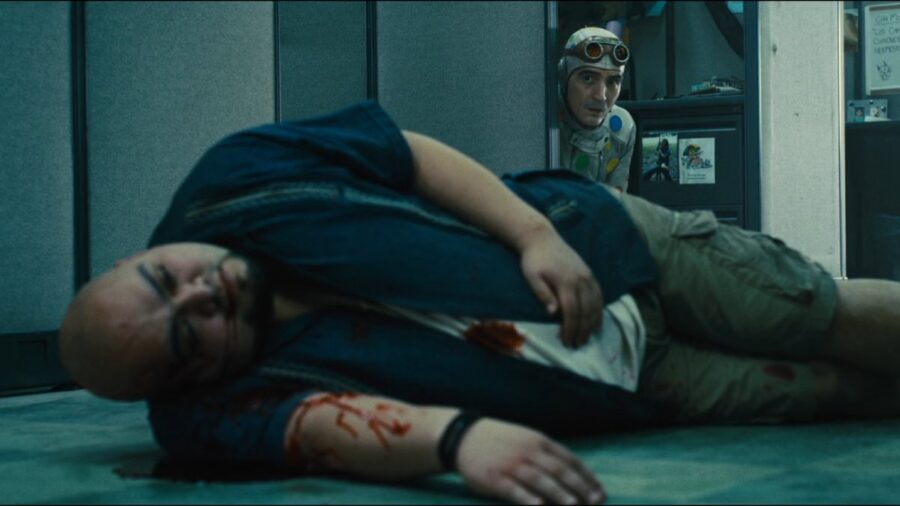
Milton’s death means more in The Suicide Squad than Dusty’s does in Gen V, simply by virtue of his death being discussed after it happens.
Be as shocking and as gross as you want, Gen V, but if you don’t even think you’re going to remember you killed a dude, then don’t kill him. Death is the worst thing, and if you’re going to show it, then make it mean something.

